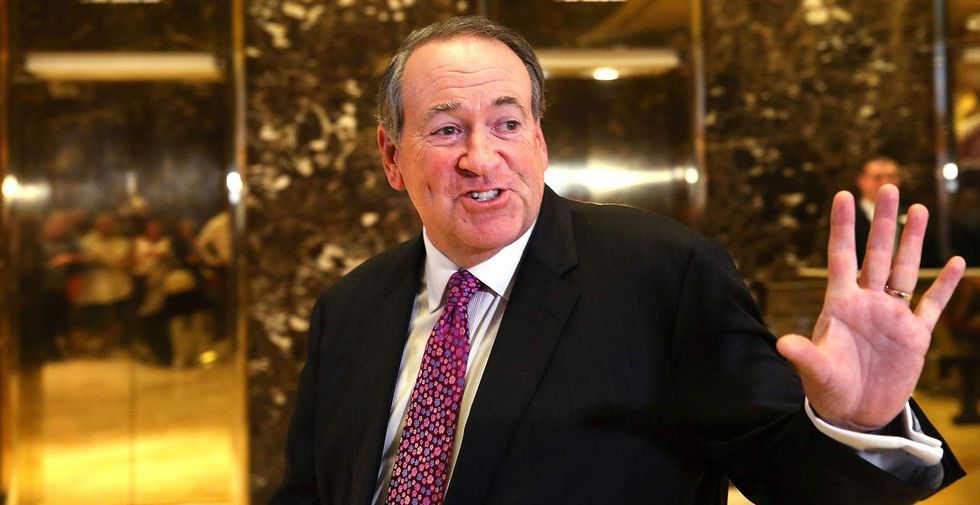
Former Arkansas Gov. Mike Huckabee (R), in a Washington Post op-ed published Thursday, pleaded with President Donald Trump to maintain funding for the National Endowment of the Arts. (Spencer Platt/Getty Images)

Former Arkansas Gov. Mike Huckabee, a Republican and an outspoken supporter of President Donald Trump, is urging the commander in chief to preserve funding for the National Endowment of the Arts.
Under Trump’s 2018 budget blueprint, funding for the NEA would be totally slashed. Though the budget is nothing more than a proposal, it does, as Office of Management and Budget Director Mick Mulvaney told reporters last week, “provide lawmakers and the public with a view of the priorities of the president and his administration.”
Huckabee, who argued his case in a Washington Post op-ed published Thursday, noted that in fiscal year 2016, NEA funding cost $147.9 million, which is 0.004 percent of the entire federal budget.
In his writing, the former presidential contender stood up for the “real recipients” of the NEA’s funding.
“I do care greatly about ... the kids in poverty for whom NEA programs may be their only chance to learn to play an instrument, test-drive their God-given creativity and develop a passion for those things that civilize and humanize us all,” he wrote.
However, while there are studies suggesting arts participation leads to higher grade-point averages as well as improvements in math, reading, and spatial reasoning, the conservative Heritage Foundation argued in the late 1990s that the NEA is not actually the best place to count on funding for the arts.
Heritage’s No. 1 reason to do away with the NEA? The arts will have plenty of support without it. For example, in 1996, the Metropolitan Opera of New York received $390,000 from the NEA — a subsidy that amounted for a mere 0.29 percent of the opera’s yearly income (which was $133 million at the time) and, in fact, totaled less than the ticket revenue from one sold-out event.
As for Huckabee’s assertion that 40 percent of the Endowment’s dollars go to low-income areas — a statistic lifted almost directly from the NEA’s fact sheet — that number is at best misleading.
According to the House Budget Committee, the NEA frequently funds programs that are “generally enjoyed by people of higher-income levels, making them a wealth transfer from poorer to wealthier citizens.”
Here’s what conservative Washington Post columnist George Will had to say about the subject:
A frequently cited study purporting to prove otherwise was meretricious: It stressed income levels of ZIP codes where NEA-funded institutions are, inferring that institutions located in low-income areas are serving low-income people.
Huckabee also offered his personal motivation in seeing the NEA’s funding preserved.
“To someone, such as me — for whom an early interest in music and the arts became a lifeline to an education and academic success — this money is not expendable, extracurricular or extraneous,” he wrote. “It is essential.”
While the NEA does make grants “in pretty much every congressional district” in the country, according to Jamie Bennett, former chief of staff at the NEA, the organization also subsidizes art that large swaths of American society — conservative society, in particular — would object to.
[graphiq id="eg69NgjBLvv" title="National Endowment for the Arts" width="500" height="600" url="https://w.graphiq.com/w/eg69NgjBLvv" ]
One of the primary pieces of “art” that comes to mind is “Piss Christ” by Catholic artist Andres Serrano, who depicted Jesus Christ on the crucifix, soaking in the artist’s urine. The piece debuted in New York in 1987 and caused an uproar two years later, when it was shown in Virginia on a tour partially funded by an NEA grant, the Post reported.
“The Virginia Museum should not be in the business of promoting and subsidizing hatred and intolerance. Would they pay the KKK to do a work defaming blacks?” one person who saw the exhibit asked at the time.
Ultimately, the argument is not really about the art that’s subsidized — it could just as well be beautiful depictions of the American landscape. It’s about whether the government, in a time when the U.S. is $20 trillion in debt, should be tasked with the subjective job of determining what art (or program) should be granted taxpayer dollars.
From HotAir’s Jazz Shaw:
Even if the national debt were currently sitting at zero and we were running a budget surplus, much like other divisive topics in society, why should the tax dollars of probably half the population be applied to any unnecessary function which those taxpayers completely disagree with or find reprehensible?
In addition, as David Marcus, artistic director of a Brooklyn-based theater project, wrote in The Federalist last month, the NEA’s funding produces “perverse market incentives.”
He wrote that even the most “successful” theater companies get barely half their revenue from ticket sales. The rest, Marcus asserted, “comes from tax-deductible donations and direct government grants.”
“This means that the real way to succeed as an arts organization is not to create a product that attracts new audiences, but to create a product that pleases those who dole out the free cash,” he wrote. “The industry receives more free money than it did a decade ago, and has fewer attendees.”
But despite all this, Huckabee just doesn’t see it that way. He sees the NEA, which was created in 1965 as a result of former Democratic President Lyndon B. Johnson’s Great Society, as a total plus for America.
“I’m for cutting waste and killing worthless programs. I’m not for cutting and killing the hope and help that come from creativity,” he wrote.
[graphiq id="bvLn60G5tOt" title="Trump's Proposed 2018 Budget" width="600" height="731" url="https://w.graphiq.com/w/bvLn60G5tOt" ]